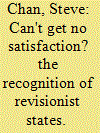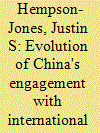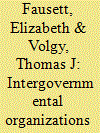| Srl | Item |
| 1 |
ID:
057998


|
|
|
| 2 |
ID:
095378


|
|
|
|
|
| Publication |
2010.
|
| Summary/Abstract |
Does membership in Intergovernmental Organizations (IGOs) affect states' human rights behavior? One might expect IGOs with a specific human rights mandate, like the International Labour Organization or the Council of Europe, to have a positive effect on the human rights practices of their member states. But what about other sorts of IGOs, particularly those with no direct connection to human rights issues? This study employs cross-national data on abuses of "physical integrity rights" for 137 countries over the period 1982-2000 to test the hypothesis that IGOs can promote the diffusion of human rights norms by providing venues for interstate socialization. Recent empirical work on IGOs has suggested that this sort of socialization effect can play an important role in promoting democracy and can also lead to a more general convergence among states' interests. The results presented here suggest that IGOs can have a surprisingly powerful influence on states' human rights practices as a result of this process.
|
|
|
|
|
|
|
|
|
|
|
|
|
|
|
|
| 3 |
ID:
165440


|
|
|
|
|
| Summary/Abstract |
Why do intergovernmental organizations (IGOs) that espouse democratic commitments suspend the membership of some states that backslide on those commitments, while leaving that of others intact? We argue that a combination of geopolitical factors and institutional rules help explain this inconsistent pattern. Remaining member states insulate geopolitically important states—particularly those with large endowments of oil resources—from suspension. Institutional factors, such as voting rules and the size of the IGO, create veto points that reduce suspensions. Using an original global data set of IGO suspensions and charter commitments from 1980 to 2010, we find strong support for our argument. We test a key assumption of existing scholarship that claims IGOs serve as credible-commitment devices for political reform and democratization. We show that once a state becomes an IGO member, it can often remain in the IGO even after violating its democratic commitments.
|
|
|
|
|
|
|
|
|
|
|
|
|
|
|
|
| 4 |
ID:
064658


|
|
|
| 5 |
ID:
066935


|
|
|
| 6 |
ID:
095376


|
|
|
|
|
| Publication |
2010.
|
| Summary/Abstract |
While the relationship between intergovernmental organizations (IGOs) and conflict has captured the attention of international relations scholars for decades, the empirical results of this research agenda have presented contradictory conclusions regarding the pacifying effect normally attributed to IGOs. We address these contradictions by refocusing primarily on potential IGO effects on low-severity conflicts. We examine new states in the postcommunist space spanning Europe and Central Asia as a useful research site to explore these relationships in the post-Cold War era. We argue that especially in the case of newly emerging states, where there is little institutional memory and long-term experience in foreign affairs, IGOs expose differential policy preferences between members, and such information should be associated with the likelihood of increased low levels of conflict. We find a strong association between shared IGO membership and low severity conflict, a significant relationship between low and high severity conflict, and differences between IGO membership effects on low versus high severity conflict, consistent with our theoretical argument.
|
|
|
|
|
|
|
|
|
|
|
|
|
|
|
|
| 7 |
ID:
080046


|
|
|
|
|
| Publication |
2007.
|
| Summary/Abstract |
This article explores the constructivists' institutional socialization hypothesis, positing that intergovernmental organizations (IGOs) make member-state interests more similar over time, thus promoting interest convergence. We first show how this hypothesis can be tested systematically using relatively new data on dyadic interest similarity and joint structured IGO membership, and then we conduct a series of empirical tests. Our results show strong statistical support for the institutional socialization hypothesis, using both global and more restricted regional samples. We also demonstrate how our results are consistent with a longer-term socialization process and cannot be explained by the short-term effect of institutional information. Finally, we show some limits to the institutional socialization hypothesis. Unstructured IGOs reveal no effect in promoting member-state interest convergence. Following recent theory arguing that great powers in the international system often use IGOs for coercive means, we find that institutional socialization gets weaker as the power imbalance within the dyad grows
|
|
|
|
|
|
|
|
|
|
|
|
|
|
|
|
| 8 |
ID:
068731


|
|
|